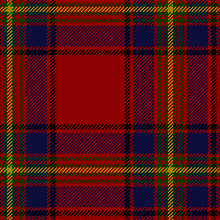
Clan Barclay is a Scottish clan of the Scottish Lowlands.
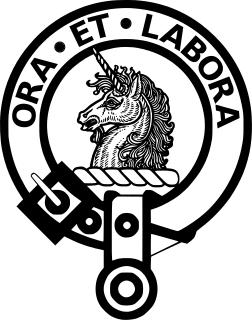
Clan Ramsay is a Lowland Scottish clan.

Clan Fraser is a Scottish clan of the Scottish Lowlands. It is not to be confused with the Clan Fraser of Lovat who are a separate Scottish clan of the Scottish Highlands. Both clans have their own separate chief, both of whom are officially recognized by the Standing Council of Scottish Chiefs.

Clan Douglas is an ancient clan or noble house from the Scottish Lowlands.

Tweedie or Tweedy is a Scottish clan name. The Clan Tweedie does not currently have a chief recognized by the Lord Lyon King of Arms and is therefore considered an Armigerous clan. However the surname is also considered a sept of the Clan Fraser. The name is derived from the lands of Tweedie which were along the Valley of the River Tweed in Peebleshire in the Scottish Borders.

The Debatable Lands, also known as debatable ground, batable ground or threip lands, lay between Scotland and England. It was formerly in question as to which it belonged, when they were distinct kingdoms. The name either signifies litigious or disputable ground, or it comes from the Old English word 'battable'.
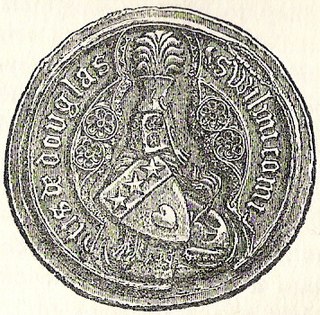
William Douglas, 1st Earl of Douglas was a Scottish nobleman, peer, magnate, and head of the Black Douglas family. Under his leadership, the Black Douglases continue their climb to preeminence in Scottish politics begun under his uncle, Sir James the Good, as well as their military dominance of the south of Scotland.

The Clan Wallace is a Lowlands Scottish Clan and is officially recognized as such by the Lord Lyon King of Arms. The most famous member of the clan was the Scottish patriot William Wallace of the late 13th and early 14th centuries.
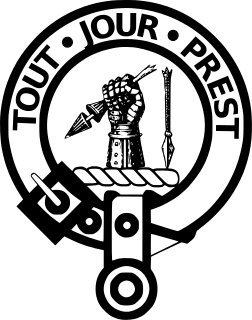
Clan Carmichael is a Scottish clan and is also considered a sept of the Clan Douglas, Clan MacDougall, Stewart of Appin, and Stewart of Galloway.

Clan Forsyth is a Scottish clan.
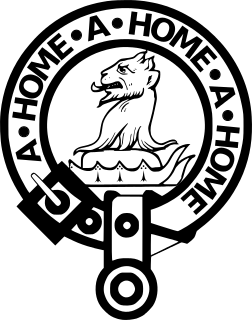
Clan Home is a Scottish clan. It held immense power for much of the Middle Ages and dominated the eastern Scottish Borders. It produced no fewer than eight Wardens of the Eastern March – more than any other family.
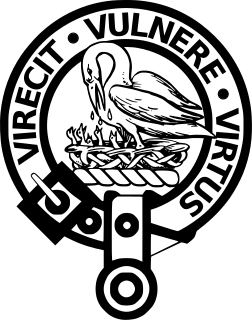
Clan Stewart is a Scottish Highland and Lowland clan. The clan is recognised by Court of the Lord Lyon; however, it does not have a Clan Chief recognised by the Lord Lyon King of Arms. Because the clan has no chief it can be considered an armigerous clan; however, the Earls of Galloway are now considered to be the principal branch of this clan, and the crest and motto of The Earls of Galloway's arms are used in the Clan Stewart crest badge. The Court of the Lord Lyon recognises two other Stewart/Stuart clans, Clan Stuart of Bute and Clan Stewart of Appin. Clan Stuart of Bute is the only one of the three clans at present which has a recognised chief.

Clan Spalding is a highland Scottish clan and sept of Clan Murray. The clan does not have a chief recognised by the Lord Lyon King of Arms so the clan is considered an armigerous clan. The Spalding family lived in Perthshire, Scotland, for one hundred and sixty three years before 1746, and dispersed to Germany, Sweden, Jamaica, Georgia, Liverpool, Virginia and elsewhere. The Castle of Ashintully was the clan centre in Perthshire.

The Anglo-Scottish border is a border separating Scotland and England which runs for 96 miles (154 km) between Marshall Meadows Bay on the east coast and the Solway Firth in the west. The surrounding area is sometimes referred to as "the Borderlands".

Clan McCorquodale is a Scottish clan, recognised by the Lord Lyon King of Arms, though without a chief so recognised. The last chief of the clan died in the 18th century. Because the clan does not have a recognised chief, it is considered an armigerous clan, and has no legal standing under Scots Law. Historically, the clan inhabited lands west of Loch Awe, in Argyll. These clan lands were centred at Loch Tromlee, where an island castle served as the clan seat. The line of Clan McCorquodale chiefs, first recorded in the 15th century, has been untraced since the 18th century.

Clan Blackadder is a Scottish clan. The clan historically held lands near the Anglo-Scottish border.

Clan Bissett is a Scottish clan. The clan is recognised by the Lord Lyon King of Arms but does not have a clan chief recognised by the Lord Lyon King of Arms, therefore the clan has no standing under Scots Law. Clan Bissett is considered an armigerous clan, meaning that it is considered to have had at one time a chief who possessed the chiefly arms; however, no one at present is in possession of such arms. The surname Bissett is also considered a sept of the Clan Fraser of Lovat.
Scottish surnames are surnames currently found in Scotland, or surnames that have a historical connection with the country.

The Corrie family, also known as the Currie family, was a Scottish family which was once seated in what is today the civil parish of Hutton and Corrie, in Annandale, Dumfriesshire, Scotland. The leading branch of the family were the Corries of that Ilk. Members of the family are on record in the Middle Ages. The family held numerous lands, but lost the lands from which they derived their surname, with the marriage of an heiress, sometime during the reign of James V, King of Scots.

Clan Fleming is a Lowland Scottish clan and is officially recognized as such by the Lord Lyon King of Arms. However, as the clan does not currently have a chief that is recognized by the Lord Lyon King of Arms it is therefore considered an armigerous clan.
